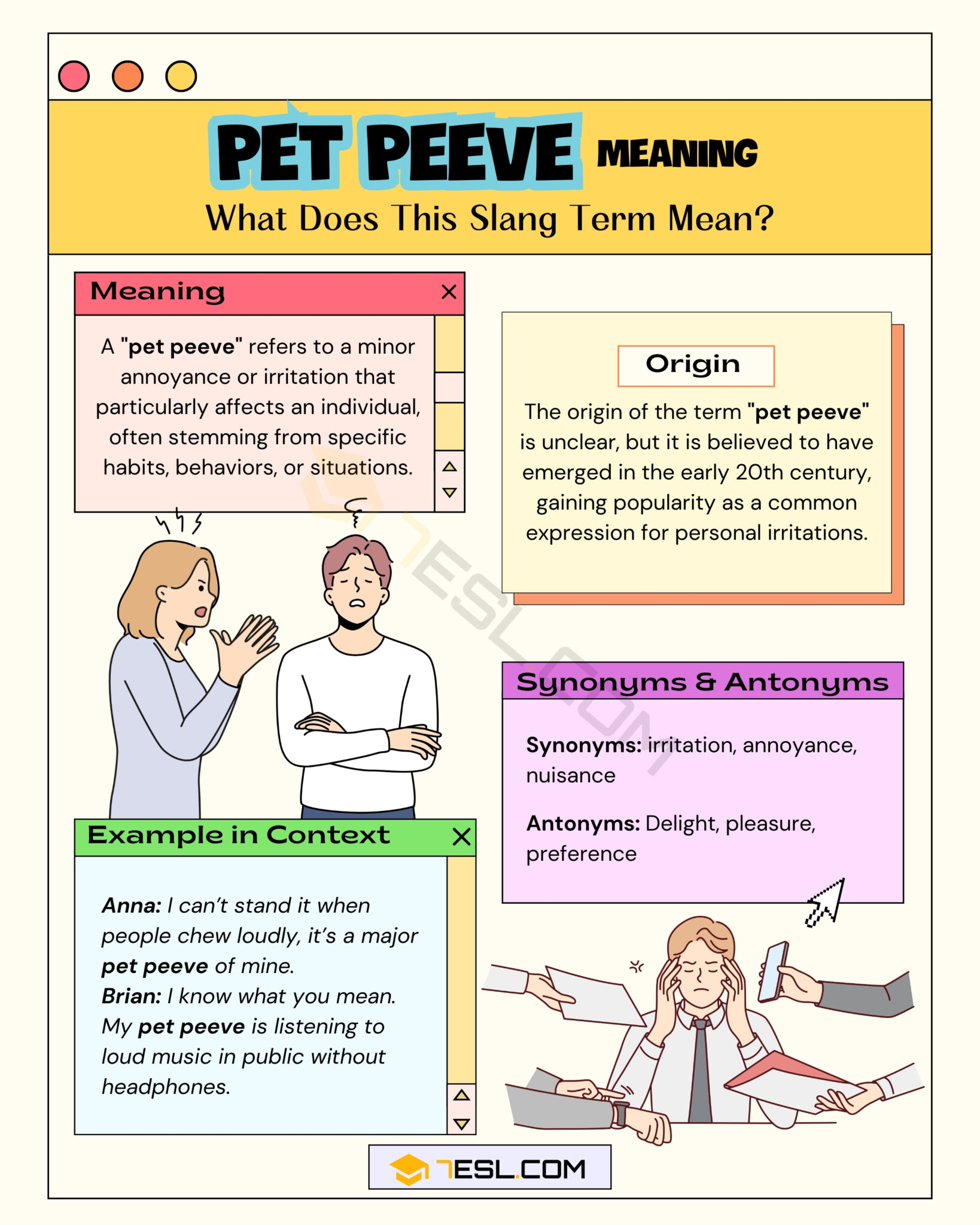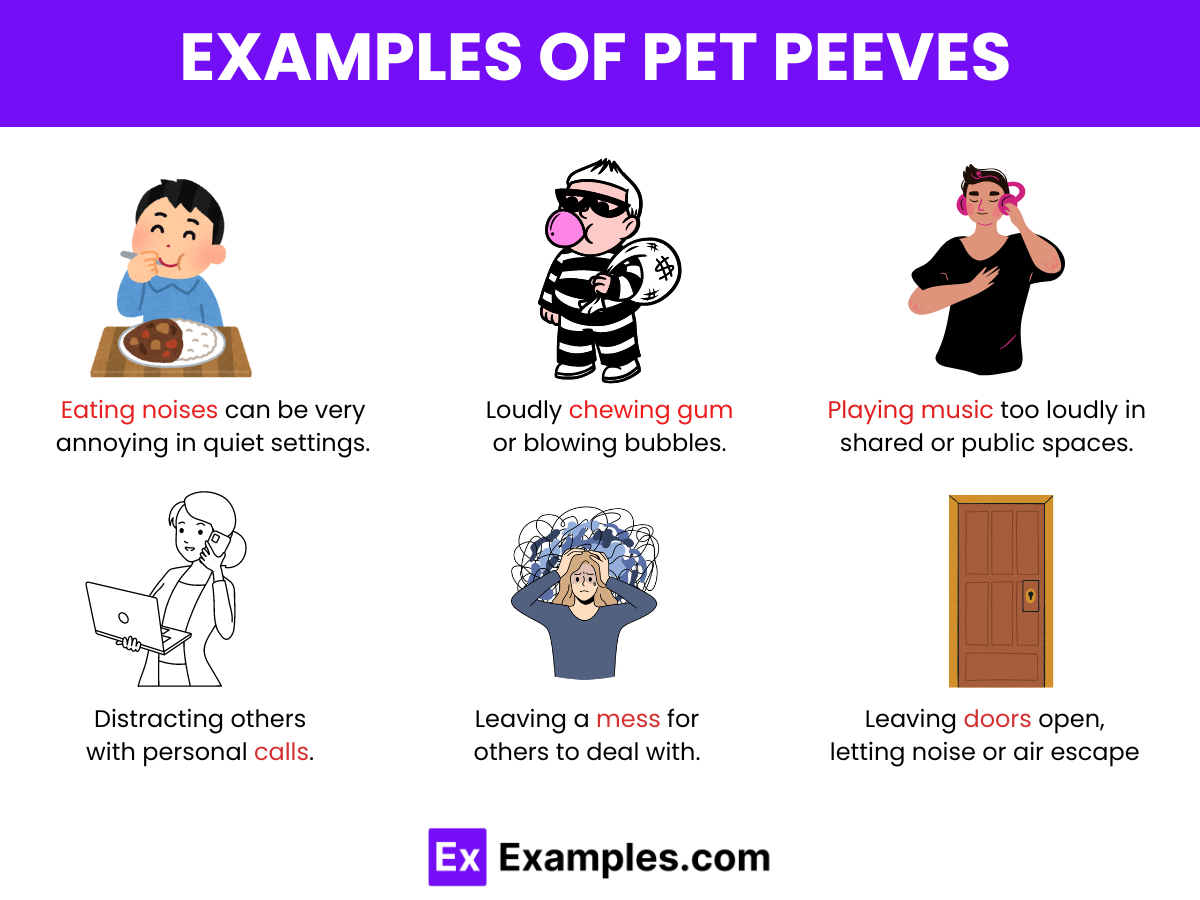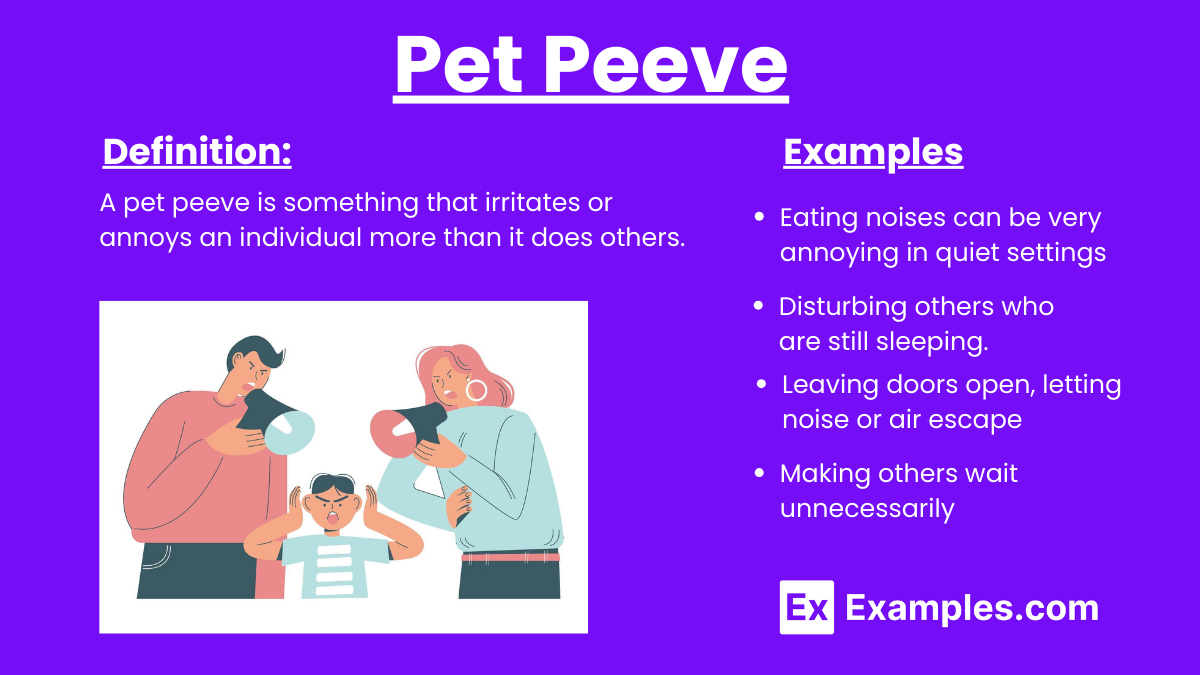Understanding Pet Peeve Meaning: What Really Gets Under Our Skin
Have you ever felt that little twitch, that slight irritation when someone does something that just, well, bothers you a lot? It’s a feeling many people share, and it often points to what we call a “pet peeve.” This idea of a specific, personal annoyance is something we all encounter, whether it's our own little quirks or the things others do that make us sigh. Learning about what a pet peeve means can help us understand these feelings a bit better, and maybe even laugh about them.
We all have those particular things that seem to rub us the wrong way, don't we? For instance, some folks really can't stand the sound of slurping, while others get a bit worked up when someone is always late. These are just a few examples of the sorts of things that, you know, really get to people. It's interesting how these small actions can cause such a noticeable reaction in us.
So, what exactly does it mean when we talk about a "pet peeve"? It's more than just a passing annoyance; it's something that consistently causes a person to feel irritated or exasperated. We will look at what this expression truly means, where it came from, and how it shows up in our daily lives. This discussion will help explain why certain things just seem to bother us so much.
Table of Contents
- What is a Pet Peeve?
- The Origin Story of "Pet Peeve"
- Common Things That Annoy People
- How We Talk About Pet Peeves
- Related Ideas and Expressions
- Frequently Asked Questions
- Finding Peace with Our Pet Peeves
What is a Pet Peeve?
When someone talks about a "pet peeve," they are pointing to a particular thing that bothers them often. It's a specific and, you know, quite a continual source of irritation for that person. It's not just something that annoys them once in a while; it's something that truly gets under their skin over and over again. This definition comes up in many places, like different dictionaries.
The meaning of pet peeve is, essentially, a frequent subject of complaint. It's something that especially annoys you. Think about it: everyone has that one thing, or maybe a few things, that just make them grit their teeth a little. It's a personal thing, too, so what bothers one person might not bother another at all. That's actually part of what makes it so interesting.
The phrase "pet peeve" shows up in idiom dictionaries, too, which helps explain what this expression truly means. It's a common way people talk about their unique annoyances. These definitions, found in comprehensive dictionaries, help us get a clear picture of this rather common human experience. It's a very clear way to describe a personal bugbear, as some might call it.
The Origin Story of "Pet Peeve"
Have you ever wondered where this rather specific phrase came from? The history of "pet peeve" is, you know, quite interesting. It's not a phrase that has been around forever. It came into use in the early 20th century. So, it's a relatively modern expression, but it describes something that people have probably felt for a very long time. This is, in a way, how language works, putting words to feelings.
Where the Words Came From
The phrase "pet peeve" is actually a combination of two separate words. The first word is "pet," which in this case, means "an especially cherished thing." This might seem a little odd at first, because a peeve is something you don't like, not something you cherish. But, you know, it makes sense if you think about it as something you "keep" or "hold onto" in a special way, even if it's an annoyance. It's a personal, almost, possession of irritation.
The second part of the phrase is "peeve." This word means "irritated or exasperated." It's derived from a later use of the word. So, when you put "pet" and "peeve" together, you get this idea of a particular, personal thing that causes irritation. It's a bit like saying "my favorite annoyance," even though you don't like it. It's something that belongs to you in terms of what bothers you. This combination, really, gives the phrase its unique flavor.
When It Started Being Used
As we noted, this expression started gaining popularity in the early 1900s. It wasn't something people said in, say, the 1800s. The exact moment it appeared is hard to pinpoint, but its rise in common speech tells us something about how people started to talk about their personal frustrations more openly. It's almost as if society needed a specific term for these sorts of, well, recurring irritations. This is, you know, how new phrases come into being.
The fact that it's a relatively newer term suggests a shift in how we categorize and discuss personal annoyances. Before this phrase, people might have just said "that bothers me" or "I dislike that." But "pet peeve" adds a layer of, you know, personal ownership to the annoyance. It highlights that this is something that specifically and repeatedly gets to an individual. It's a rather neat way to put it, actually.
Common Things That Annoy People
So, what sorts of things show up on lists of the biggest pet peeves? Our shared experiences tell us there are quite a few. For instance, the sound of slurping is one that many people find, you know, really grating. It's a sound that, for some, can instantly change their mood. This is a very common one, actually, that comes up often in conversations about annoyances. It's just a little thing, but it can be a big deal.
Another very common one is being late. For many, punctuality is quite important, and when someone consistently shows up past the agreed time, it can feel like a lack of respect for one's time. This is, you know, a frequent subject of complaint for many people. It's something that really bothers those who value promptness. It can feel like a personal slight, in a way.
Beyond slurping and tardiness, there are countless other things that qualify as pet peeves. Things like leaving dirty dishes in the sink, talking loudly on a phone in a quiet place, or people who chew with their mouth open. These are all examples of a particular and often continual annoyance for someone. Everyone has their own unique collection of these little things, so to speak. It’s almost endless, the variety.
Some people get quite bothered by, say, someone leaving a shopping cart in the middle of a parking spot. Others might find it irritating when people don't use turn signals while driving. These are, you know, small actions that can create a lot of internal frustration. It's interesting how these tiny habits can really get to us, isn't it? It just goes to show how different we all are.
How We Talk About Pet Peeves
Knowing the meaning of pet peeve is one thing, but how do we actually use this phrase in our conversations? It's pretty straightforward, actually. You simply state what the thing is that bothers you. For example, you might say, "My biggest pet peeve is when people leave their dirty socks on the floor." This shows how to use pet peeve in a sentence quite easily. It's a very common way to express a personal annoyance.
We see examples of pet peeve used in sentences all the time. Someone might say, "It's my pet peeve when the internet connection is slow." Or, "Her pet peeve is people who interrupt her when she's speaking." These examples show how versatile the phrase is. It allows us to clearly communicate something that especially annoys us without having to explain it in great detail. It's a neat linguistic shortcut, really.
The phrase is often used in a lighthearted way, even though the feeling itself can be genuinely irritating. People share their pet peeves with friends, sometimes as a way to bond over shared frustrations. It's a way of saying, "You know what I mean, right?" It creates a sense of, you know, shared experience. This makes it a pretty common topic for, say, casual chats or even online discussions. It's a very relatable subject.
So, when you hear someone say, "What's your pet peeve?" they are asking about that one thing, or perhaps a few things, that consistently get on your nerves. It's a question that, you know, often leads to some interesting and sometimes funny answers. It's a way to get to know someone's particular quirks and what makes them tick. It really is a simple, direct way to talk about these personal irritations.
Related Ideas and Expressions
While "pet peeve" is a very popular phrase, there are other ways to talk about similar feelings. One term that comes to mind is "personal bugbear." This has a similar meaning: something that causes a particular and often continual annoyance for someone. The words "bugbear" itself suggests something that causes fright or irritation, so adding "personal" makes it quite similar to a pet peeve. It's just another way of saying the same sort of thing, you know.
You might also hear people talk about things that "get on their nerves" or "grate on them." These expressions also describe something that causes irritation. However, "pet peeve" has a unique flavor because of the "pet" part, which implies a certain personal ownership or familiarity with the annoyance. It's not just something that bothers you; it's *your* particular thing that bothers you. That's, you know, a key difference.
Another related concept is a "sore spot" or a "trigger." These can be similar in that they refer to something that causes a strong negative reaction. But "pet peeve" often describes something that is more of a consistent, low-level irritation rather than a sudden, intense emotional response. It's more about the everyday little things that, you know, just wear on you over time. It's a subtle distinction, really.
The definitions provided by various dictionaries, including idiom dictionaries, often list these similar terms. This helps to show the full range of ways we talk about things that bother us. Understanding these related ideas can help us to better grasp the full scope of what "pet peeve meaning" truly covers. It's all about those things that, you know, cause us a bit of bother in our daily routines. To learn more about common expressions, you could look up general idiom resources online, for instance, a reliable language reference site like Merriam-Webster's idiom dictionary.
Frequently Asked Questions
What is an example of a pet peeve?
A very common example of a pet peeve is the sound of someone slurping their drink or food. Another one that many people mention is when someone is consistently late for appointments or meetings. These are things that, you know, frequently bother a lot of people. Everyone has their own specific examples, too, like people who talk loudly on their phones in public places. It's a pretty wide range of things, actually.
What is the origin of the word peeve?
The word "peeve" comes from a longer word, "peevish," which means irritable or ill-tempered. Over time, "peevish" was shortened to "peeve" to describe the feeling of being irritated or exasperated. This happened, you know, over some time. So, the word itself has roots in describing a state of being bothered. It's a fairly old word, in its original form.
Is a pet peeve a real thing?
Yes, absolutely, a pet peeve is a very real thing for many people. It describes a genuine feeling of annoyance or irritation that a person experiences repeatedly because of a specific behavior or situation. While it's a personal feeling, the impact it has on an individual is, you know, quite real. It's not just made up; it's a true human experience. Many people can relate to having one, or several, of these. It's definitely a common part of life.
Finding Peace with Our Pet Peeves
Understanding the pet peeve meaning helps us to recognize these little irritations for what they are: personal, often consistent annoyances. Knowing their origin and seeing common examples can make us feel a bit less alone in our frustrations. It's, you know, a shared human experience. We all have those things that just seem to rub us the wrong way, and that's perfectly okay. It's part of what makes us individuals, actually.
Perhaps by acknowledging our own pet peeves, and maybe even sharing them with others, we can find a bit of humor in them. It can be a way to connect with people, or just to understand ourselves a little better. After all, everyone has their own list of things that, you know, really get to them. So, the next time something bothers you, you'll know exactly what to call it. It's a useful term to have, really.
If you're interested in more common expressions and how they shape our everyday talks, you can Learn more about language quirks on our site. Also, to explore how different words come into being, you might want to link to this page about word origins. We hope this look at the pet peeve meaning has given you a clearer picture of this common phrase and the feelings it describes, even the ones that, you know, cause a little sigh.

Pet Peeve Meaning: What Does This Slang Term Mean? • 7ESL

70+ Pet Peeve Examples

70+ Pet Peeve Examples